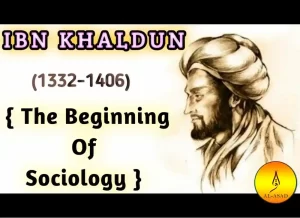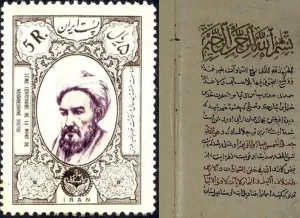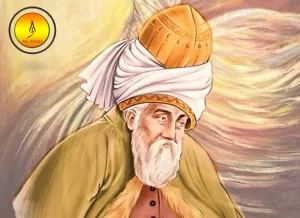Al-Ghazali is a great Islamic jurist, theologian and mystical thinker. In his hometown of Tus in the northern region of Iran, he studied various Islamic religious sciences. From an early age, he was involved in Sufi practice. He was recognized by Nizam Al-Mulk, the vizir for the Seljuq Sultans, and was made head of Nizamiyyah College in Baghdad in ah 484, ad 1091.
He was the intellectual head for the Islamic community and was constantly lecturing at the College on Islamic jurisprudence, as well as refuting heresies, and answering questions from all sections of the community. Al-Ghazali, who was then in a severe spiritual crisis four years later, left Baghdad and resigned from his job and all his responsibilities to the world.
After spending two years wandering through Syria and Palestine, and completing the pilgrimage to Mecca for two, al-Ghazali returned to Tus where he continued to write, teach his students, and continue his Sufi practice until his death. He returned to Nishapur and taught for a few more years at Nizamiyyah College.
Suggested Read: The Islamic World by Ladan Akbarnia, Nahj al-Balagha by Imam Ali Ibn Abi Taleb, Lost Islamic History by Firas Alkhateeb, Stranger The History by Aatish Taseer, Prophet Muhammad (PBUH) by Abu Moosa Reza, Islamic Art by Luca Mozzati and Islamic History For Kids: Story of Uhud
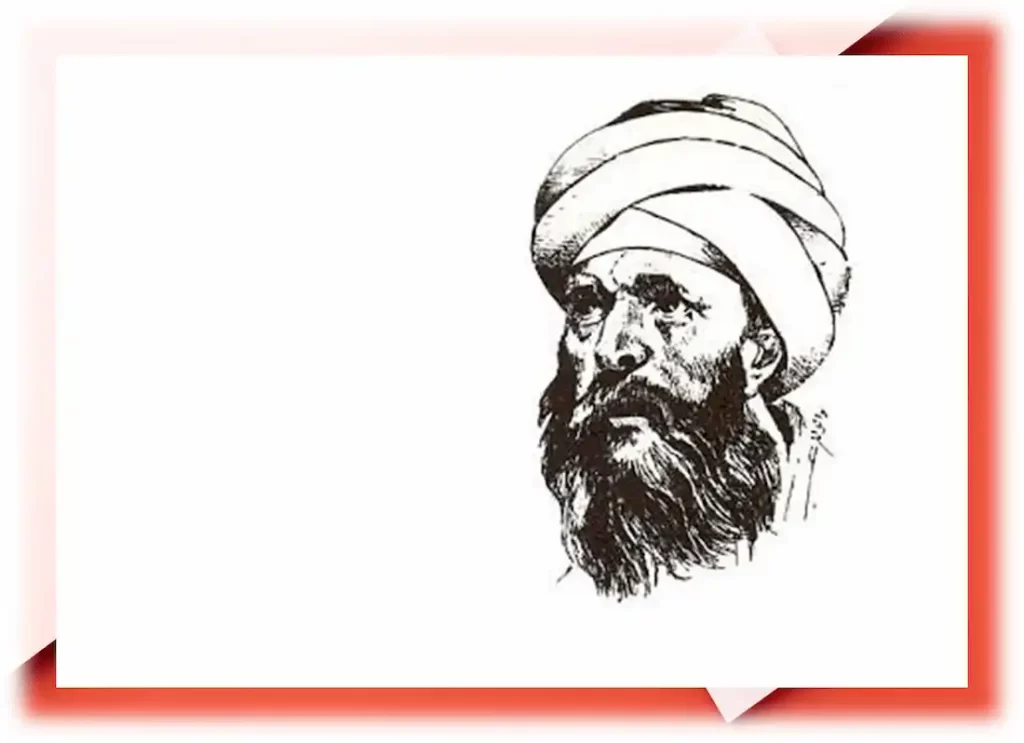
Al-Ghazali explains in his autobiography how he quit his successful career to follow Sufism. He says it was because he realized that only Sufism could lead to certainty and conviction of the revelatory truth. This means that the original Islamic faith was in a very difficult place at the time.
This realization may be related to his criticisms of Islamic philosophy. His refutation of philosophy does not reflect a mere critique from an orthodox theological perspective. His attitude towards philosophy was first ambivalent. It was an object, criticism, and object of learning (for instance logic and the natural sciences). He studied philosophy, then critiqued it to Islamize it.
His philosophical argument that philosophers’ metaphysical arguments could not be tested by reason is the most important part of his criticism. He was forced to accept that reason cannot give him the certainty of revelatory truth he had been searching for. He finally found that truth in the Sufi’s ecstatic state (fana) only later.
His own religious experiences led him to work to restore Islam’s faith by reconstructing religious sciences on the basis of Sufism and to provide a theoretical foundation for the latter, under the influence philosophy. Sufism was thus recognized by the Islamic community. Al-Ghazali’s critique of Islamic philosophy didn’t last long, but he greatly contributed to the subsequent philosophization Islamic theology as well as Sufism.
Suggested Read : How Many Chapters in Quran? ,la ilaha illa anta subhanaka, Has The Quran Been Changed?, How Many Pages in Quran? , Allahumma Ajirni Minan Naar, Allahu Mahdina, Allahu Alam , Allah Yashfeek , Allah Subhanahu Wa Ta’ala
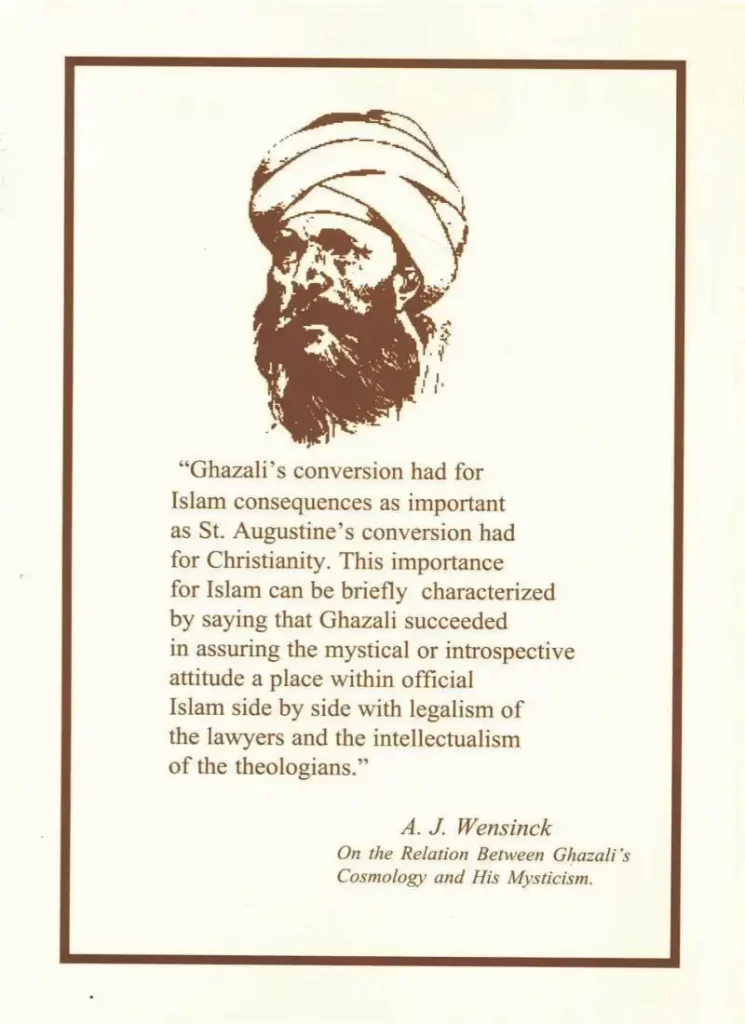
1. Life
Three major periods can be used to describe the life of Abu Hamid Muhammad Muhammad ibn Muhammad al–Ghazali (or al–Ghazzali). The first period is one of learning. He began in Tus, Persia. He then moved to Gurgan, and then finally to Nishapur. Ghazali was appointed head of Nizamiyyah College in Baghdad by Imam al-Haramayn al-Juwayni after the death of his teacher, Imam al-Haramayn al-Juwayni .
Al-Ghazali’s second period was his brillant career as an orthodox doctor in Baghdad’s Islamic community (ah 484-8/ad 1191-5). It was a short, but important period. He was busy during this period lecturing at the College on Islamic jurisprudence. Al-Ghazali, who was caught up in the political chaos following the assassination Nizam alMulk’s death and the subsequent brutal death of Sultan Malikshah fell into a deep spiritual crisis. He left Baghdad and resigned from his career.
This is the start of his third period, the period of retirement (ah488-505/ad1095-1111), which also included a brief period teaching at Nishapur’s Nizamiyyah College. He left Baghdad and traveled as a Sufi through Syria and Palestine, before returning to Tus where he continued his writing, Sufi practices, and teaching his followers until his death.
His autobiography al–Munqidh minal-dalal (The Deliverer From Error) explains the inner transformation that led to his conversion. It was written late in his career. He says that he was a habitual seeker of the truth of all things from an early age. He began to question the validity of his senses and reason as a means of ‘certain knowledge’ and fell into deep scepticism.
He was saved by the divine light and regained his faith in reason. He then used reason to study the teachings of the’seekers after truth’, which included philosophers, theologians and Isma’ilis, as well as the Sufis. After these investigations, he realized that Sufism was the only way to attain certain knowledge. To reach the ultimate truth of Sufism, one must first give up the world and dedicate himself to mystical practice. Al-Ghazali reached this realization after an agonising decision process that led to nervous breakdowns and eventually his departure from Baghdad.
Although alMunqidh can be interpreted in many ways, it is not necessary to question the core of the story. While al Mulqidh describes certain knowledge as something that is logically required, it is also a religious conviction ( Yaqin), as described in the Ihya’ ‘ulum al–din (The Revival of the Religious Sciences). When he states that traditional teachings didn’t grip him as a teenager, he is referring to the fact that he lost his belief in their truth which he later gained through his Sufi mystical experiences. This experience was used to treat ‘the disease’ in his lifetime.
Al-Ghazali’s life has been largely viewed as his development of individual personality. There have been some attempts since the 1950s to better understand his life within a larger historical and political context (Watt 63). We should not reduce his thought or work to non-religious elements if we accept his confession of faith. Al-Ghazali’s conversion to Sufism from a life as an orthodox physician was likely not only the result of his personal growth but also a sign of a new understanding of faith in historical Islam.
This stage moves from the traditional faith of the attempt to establish the kingdom on Earth through the Shari’a to a faith that is expressed in direct communion with God through Sufi mystical experiences. This could be an indication of a change in faith that has made the old type of faith irrelevant and became a formality because of the social and political confusion within the community. Al-Ghazali was affected by this change in his own life and attempted to revive the whole structure of religious sciences on Sufism’s basis. He also advocated for official recognition and provided solid philosophical foundations.
2. Theological concepts
Al-Ghazali authored at least two works on theology: al-Iqtisad fil-i’tiqad and al-Risala al-Qudsiyya. The first was written in Baghdad at the end of his stay, and followed his critique of philosophy. The latter was composed shortly afterwards in Jerusalem. Both works express an Ash’arite theological position. There is no fundamental difference in the Ash’arite school and al-Ghazali’s (see Ash’ariyya, Mu’tazila). Some changes can be observed in his later works on theology, which were written under the influence philosophy and Sufism (see also SS4).
The two schools share a lot in common, but there are some differences. Ash’arite is a form of rationalistic Mu’tazilite theology. They do not have an essential difference in God’s essence ( dhat Allah). Al-Ghazali proves God’s existence from the createdness of the world ( hadath), according to the Ash’arite tradition. This presupposes an atomistic ontology, but there are philosophical arguments to counter the criticisms of the philosophers.
Al-Ghazali refers to God’s attributes as “something different from, but added to, God’s essence” ( al Iqtisad 65). The Mu’tazilites, however, deny the existence and reduce them back to God’s essences and acts. Al-Ghazali claims that God has attributes like knowledge, will, hearing and seeing, and these are all part of God’s essence. They are also coeternal with God. Both God’s essence ( ) and his attributes are considered to be ‘not identical but not different’.
Al-Iqtisad :65 God’s eternal will, power and knowledge are responsible for the creation of the world, and subsequent changes to it. However, this does not necessarily mean that God’s attributes have changed in response to these changes in the empirical universe.
The relationship between God’s power, and human actions was a major issue in theological debate. While the Mu’tazilites admitted that there was a continuation of an accident ( ‘arad), they maintained that human actions were determined and produced by humans.
This justified human responsibility and upheld divine justice. Al-Ghazali, however, believes that all events and human actions are caused by God’s knowledge, will, and power. Both human power and human act are created by God. Therefore, human action can be considered God’s creation ( Khalq), but also human acquisition ( Kasb). God’s action is reflected in human will. Al-Ghazali attempts to reconcile God’s omnipotence with our responsibility for our actions (see The Omnipotence).
The Mu’tazilites emphasize divine justice and say that God can’t impose any obligation on people beyond their capabilities. God must do the best for humanity and must reward and punish those who obey. It is mandatory for people to be able to reason with God even before revelation.
These views are denied by Al-Ghazali. He claims that God can place any obligation upon us. It is not his responsibility to do the best for us or to reward us and punish us according to our disobedience and obedience.
God is completely free and has no obligation to do any of these things. Al-Ghazali says that obligation ( wujub) is something that causes serious harm, but God does not suffer any harm. Good ( hasan), and evil ( Qabih_) both refer to congruity or incongruity with an objective, but God does not have any purpose. God’s actions are therefore beyond human moral judgment. Al-Ghazali also says that injustice ( zurlm ) is an encroachment upon the rights of others. However, all creatures belong to God, so whatever he does to them, it cannot be considered unjust.
The Mu’tazilites believe that the hereafter is inferred from the world of this world. They also deny the punishment of believers in the grave from their deaths until the resurrection. Al-Ghazali on the other side, refusing to accept the principle of analogy, supports the reality of all these events as they were transmitted traditionally. It cannot be proved that they are rationally and logically impossible.
The eschatological event of the seeing God ( Ru’ya Allah) is another important one. The Mu’tazilites reject its existence, saying that God can not be the object for human vision. Al-Ghazali however, approves it as a type of knowledge which transcends corporeality. He later gives the visions of God deep philosophical and mystical meanings. The Mu’tazilites talk about the unity of God and His acts from the perspective of human reason. Al-Ghazali however, does so on the assumption that God is personal and an absolute reality transcending human reason.
3. Refutation philosophy
Al-Ghazali’s relationship to philosophy is complex and subtle. Al-Ghazali’s relationship with philosophy is complex and subtle. Al-Ghazali spent a lot of time studying philosophy in Baghdad. He wrote Maqasid al-falasifa (“The Intentions of the Philosophers”) and then critiqued it in his Tahafut al-falasifa (“The Incoherence of the Philosophers”).
The Maqasid provides a concise summary of philosophy. It is believed to be an Arabic translation of Ibn Sina’s Persian Danashnamah–yi ala’i (Book of Scientific Knowledge), though a comparative study of both works is yet to be done. The Maqasid content was thought to be al-Ghazali’s original thought in the medieval Latin world. This was due to textual errors in the Latin manuscripts. The image of the “Philosopher Algazel” was thus created.
Munk made use of complete manuscripts of Hebrew translations to correct this error in the middle part of the nineteenth century. Al-Ghazali published more works, some of which contained philosophical ideas that he had rejected. Al-Ghazali’s relationship to philosophy was once more obscured.
Was he a late convert to philosophy? He was a secret philosopher? Al-Ghazali’s authenticity was verified through textual criticism. This led to the establishment of al-Ghazali’s image as an Ash’arite orthodox theologian. Al-Ghazali’s relationship to philosophy and traditional Ash’arism is now being reexamined. However, it is important to recognize his fundamental distance from philosophy.
Al-Ghazali wrote three works on Aristotelian logical theory, Mi’yar al-‘ilm, Mihakk al-nazar f’l-mantiq and al-Qistas al-mustaqim. The Tahafut was published immediately. The third work was written after his retirement. In the lengthy introduction to his book al–Mustasfa min al-usul (The Essentials of Islamic Legal Theory),, he also explained logic. Al-Ghazali’s interest in logic is not common, especially considering that most Muslim theologians are hostile to it. This can be attributed to logic’s usefulness in refuting heretical views ( Al-Qistas also refuts the Isma’ilis), as well as to his fascination with logic’s effectiveness in reconstructing religious sciences on a solid foundation.
There is a fundamental disparity between al-Ghazali’s theological view and the Neoplatonic-Aristotelian philosophy of emanationism. Al-Ghazali exemplifies this view in twenty points. Three of these are particularly prominent: (1) Al-Ghazali’s belief in the eternality of the world; (2) Al-Ghazali’s doctrine that God doesn’t know particulars; and (3) Al-Ghazali’s denial of the resurrection. These are reducible to different conceptions of God or ontology. Al-Ghazali’s critique of philosophy is, interestingly, philosophical and not theological. He views it from the perspective of reason.
The philosophers first claim that the eternality of the world is due to the necessary causality in God’s essence. Therefore, the creation of the First Intellect as well as other beings is coeternal and concomitant with God’s existence. (see Creation, conservation, religious doctrines of). The philosophers suggest that God created the universe at a particular moment in time.
This would require a change of God, which is impossible. Furthermore, each moment of time is identical, so it is impossible for God to pick a specific moment for creation. Al-Ghazali counters that God created the world in the eternal past and does not indicate any change in God. In fact, time is God’s creation. This argument is also based on the Aristotelian idea of time as a function or change. The current of time is identical in all parts, but it is God’s nature to choose one particular from a multitude of others.
The philosophers second deny God’s understanding of particulars, or limit it to their self-knowledge. They believe that God’s connection with particulars implies a change in God’s essence and plurality. Al-Ghazali refutes this. God will not change His eternal knowledge if he has all the information about a person, regardless of how their lives have changed.
The philosophers also deny bodily resurrection and claim that “the resurrection” is in fact the separation of the soul and the body after death. Al-Ghazali attacks this argument and also attacks the theory that causality is presupposed by the philosophers’ arguments. (see Causality and necessity in Islamic thought).
Al-Ghazali says that the so-called necessity for causality is based only on the fact that events A and B have so far occurred simultaneously. Because A and B are not connected in a logical way, there is no guarantee that this relationship will continue. According to Ash’arite Atomistic Instancealism, God is the direct cause of A and B. God creates A by creating B. He can theoretically change his custom ( Sunna, ‘ada), at any time and resurrect the deceased: this is actually ‘a second creation’.
Al-Ghazali claims that philosophers’ arguments can not survive philosophical criticism. Aristotelian logic was used as a powerful weapon to achieve this end. But, the conclusion of philosophy can’t be proven by reason. What about theological principles and teachings of revelation? How can we prove the truth of these? This is the strength of al-Ghazali’s criticism of reason.
4. Philosophy and its relationship
After al-Ghazali’s criticism of philosophy, philosophy declined in the Sunni world. Nearly a century later Ibn Rushd (Averroes), tried to resist the trend in his Tahafut (The Incoherence of the Incoherence) and Fasl al–maqal, but he couldn’t stop it. The philosophy was slowly absorbed into Sufism, and further developed as mystical philosophy in the Shi’ite community (see Mystical Philosophy in Islam). Aristotelian logic was also incorporated in theology in the Sunni world, and Sufism was partly represented philosophically. Al-Ghazali had a significant influence on all of this.
Ghazali dedicated himself to Sufism during his later years. He produced a number of original works on Sufism, including Mizan al-‘amal, (The Balance of Action), written just before his retirement. Ihya’ ‘ulum al-din was his magnum opus after retirement. Kitab al-arba’inf usul al-din (The Forty Chapters on the Principles of Religion), Kimiya’-yi sa’adat, Mishkat al-anwar (The Niche of the Lights), and other.
According to Islam, salvation in paradise is the ultimate goal for humankind. This is described in the Qur’an as various sensuous pleasures or joy at the sight of God. Al-Ghazali’s greatest joy is seeing God in the intellectual and spiritual senses of the beatific vision. Sensuous pleasures, however, are insignificant in comparison. They are still necessary for those who can’t see the big picture.
Resurrection of Ibn Sina is the death of an individual – it’s the seperation between the soul and the body. The rewards and punishments following the’resurrection’ are the joys and pains that the soul experiences after death. Through intellectual and ethical training, the soul is in constant contact with the active mind and can enjoy the blissful union with it after death.
The soul who has become used to sensual pleasures while living suffers from the unfulfilled desires. This is because the instrumental organs that were meant for this purpose have been lost. Al-Ghazali refers to death as ‘the little resurrection’ and accepts that the soul remains after death, just like Ibn Sina. The elite’s beatific vision of God after the quickening, or ‘the big resurrection’ is intellectual, on the other hand. The Sufi’s mystical experience ( fana’ ) is a glimpse of the true vision of God in eternity.
Al-Ghazali’s view on human beings shows a similar influence from philosophy. While soul and body are two sides of the human being, their essence is the soul. The soul of the human being is a spiritual substance that is completely different from the body. It is something that is divine ( amrilahi), and makes it possible to know God. Al-Ghazali believes that the soul is an incorporeal substance that occupies no space, as Ibn Sina suggests.
However, he avoids making direct statements to this effect. The concept of the soul in al-Ghazali’s view is very different to the idea of the soul as a’simple body’ as theologians generally consider it. Al-Ghazali believes that the body is a vehicle for the soul and an instrument to carry out its bodily functions. If the main faculties of hunger, anger, and intellect are well-balanced and balanced, we can find the virtues temperance, courage and wisdom. However, we often see many vicious traits because there is too much or too little of each faculty. All this is due to love of the world (see soul in Islamic philosophy).
These religious exercises are meant to correct these bad dispositions and bring you closer to God. This is the process of transforming the bad traits of the soul by using bodily exercises that rely on the inner relationship between the body and the soul. Al-Ghazali makes extensive use of the Aristotelian theory about the golden mean. He mainly derived this idea from Ibn Miskawayh. The mundane order and society are essential for maintaining the earthly existence, or as a means to the soul’s purpose. This framework allows for the reexamination and reconstruction of the traditional Islamic law, community, and society.
Al-Ghazali’s Cosmology is the same. Al-Ghazali divides the cosmos in three realms: The world of muk, the phenomenal world, and the worlds of malakut (the hidden world), respectively. This division is based on the Sufi theorist Abu Talib al-Makki’s, but he reverses the meanings malakut as well as jabarut. Malakut refers to the world of God’s determination. It is a world where angels are free from change, increase, and decrease.
This is the Preserved Tablet world in heaven, where God’s decree has been inscribed. This phenomenal world is an incomplete copy of the malakut world, which is the reality and essence of all things. In some ways, the latter is similar to Ibn Sina’s world of intelligibles or the Platonic World of Ideas. Only difference is that malakut was created once for all by God. He then continues to create phenomenal worlds moment by moment according to his will. This is a significant difference to the emanationist deterministic philosophy world.
The phenomenal world evolves and changes according to a sequence of causes and consequences once the divine determination has been made. This relationship is different from the philosophers’ causality in that the relation between cause and effect is not necessary. Al-Ghazali’s emphasis on causality is different from traditional Ash’arite occasionalism.
In their mystical experiences, the Sufis and the ordinary person in their dreams are allowed to see the Preserved Tablet’s world in heaven when the veil between the soul and that world is temporarily lifted. They are thus given foreknowledge as well as other forms of supernatural information. The revelation that an angel gives to prophets is basically the same.
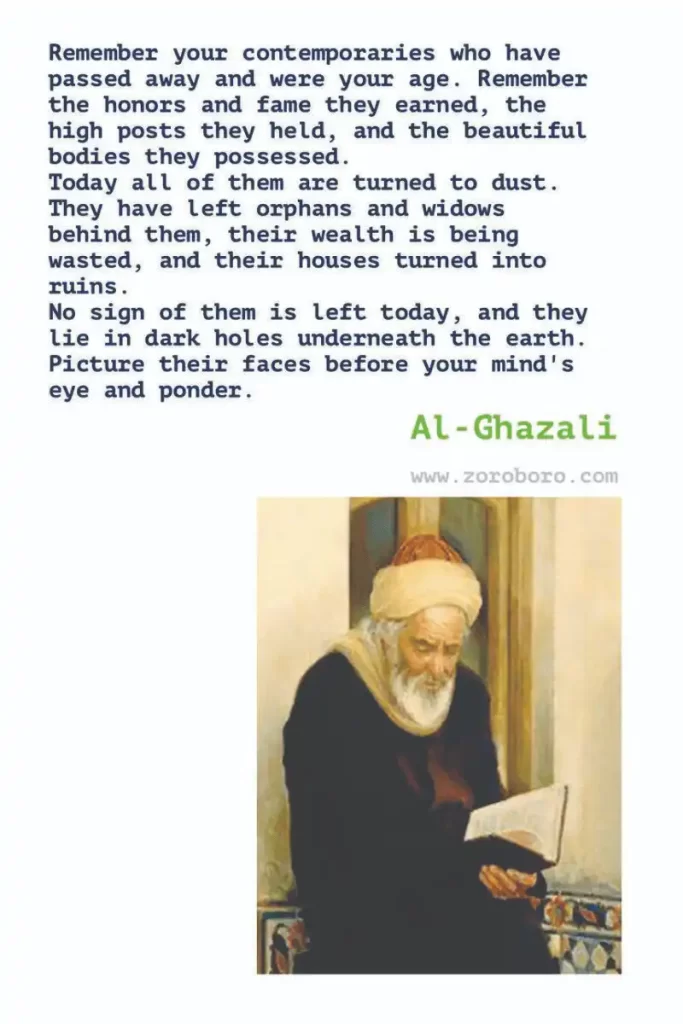
Suggested Read:
CONCLUSION
However, the prophets don’t need special preparation. Al-Ghazali believes that the world is perfect and the best it can be from the perspective of those who have such special knowledge about the invisible world. This optimism sparked criticism and arguments even during his lifetime.
He was accused of proposing a Mu’tazilite, or philosophical teaching that would be opposed to orthodox Ash’arism. His theological works clearly state that God does not have to do what is best for humanity. However, it does not necessarily mean that God won’t do what is best for him. Al-Ghazali claims that God does this in reality, but we can still see the influence of philosophy, and Sufism.
Al-Ghazali’s critique of philosophy and mystical thought is often compared with the philosophical and theological thoughts of Thomas Aquinas and Nicholas from Autrecourt. He was widely considered a philosopher in the medieval world. His writings were translated into Latin and Hebrew by thinkers such as Yehuda Halevi and Moses Maimonides.




